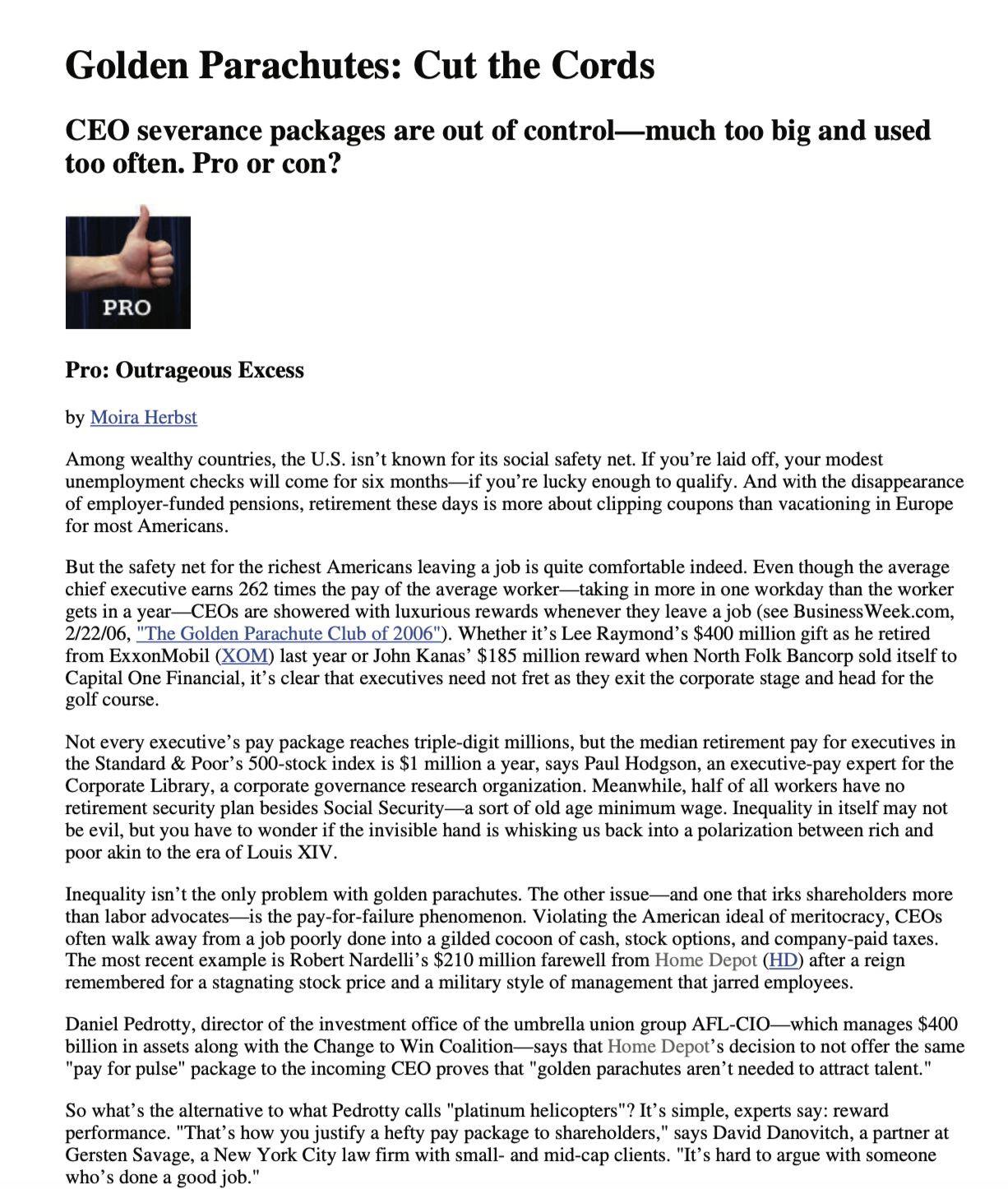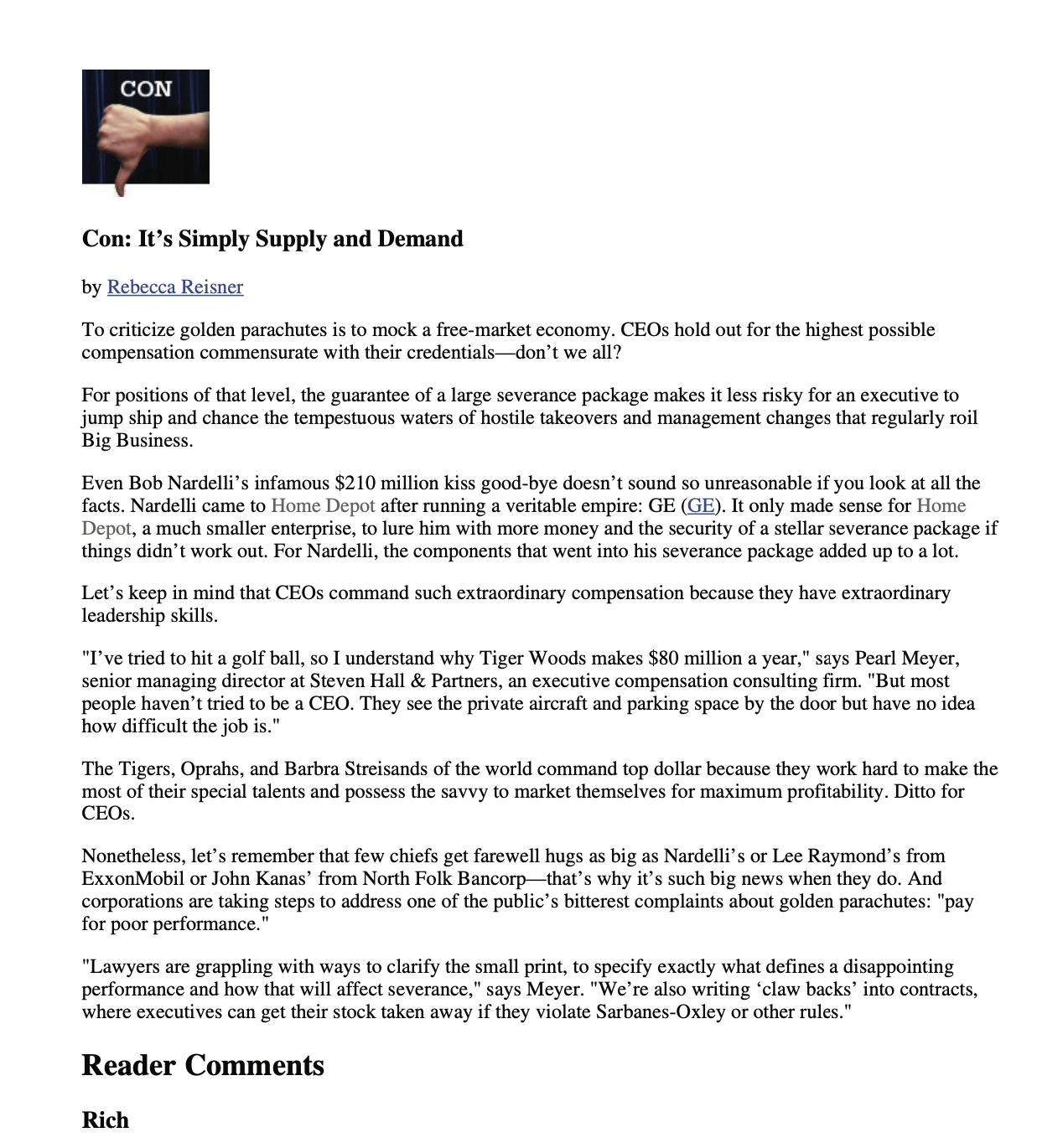Answered step by step
Verified Expert Solution
Question
1 Approved Answer
Read this artice that discusses the 'golden parachutes' given to some CEOs. Are you for or against golden parachutes after reading the article? Do you
Read this artice that discusses the 'golden parachutes' given to some CEOs. Are you for or against golden parachutes after reading the article? Do you think CEOs are worth what they are paid in general, beyond just the golden parachutes discussed?

 Golden Parachutes: Cut the Cords CEO severance packages are out of controlmuch too big and used too often. Pro or con? Pro: Outrageous Excess by Moira Herbst Among wealthy countries, the U.S. isn't known for its social safety net. If you're laid off, your modest unemployment checks will come for six months-if you're lucky enough to qualify. And with the disappearance of employer-funded pensions, retirement these days is more about clipping coupons than vacationing in Europe for most Americans. But the safety net for the richest Americans leaving a job is quite comfortable indeed. Even though the average chief executive earns 262 times the pay of the average worker-taking in more in one workday than the worker gets in a year-CEOs are showered with luxurious rewards whenever they leave a job (see BusinessWeek.com, 2/22/06, "The Golden Parachute Club of 2006"). Whether it's Lee Raymond's \$400 million gift as he retired from ExxonMobil (XOM) last year or John Kanas' \$185 million reward when North Folk Bancorp sold itself to Capital One Financial, it's clear that executives need not fret as they exit the corporate stage and head for the golf course. Not every executive's pay package reaches triple-digit millions, but the median retirement pay for executives in the Standard \& Poor's 500-stock index is \$1 million a year, says Paul Hodgson, an executive-pay expert for the Corporate Library, a corporate governance research organization. Meanwhile, half of all workers have no retirement security plan besides Social Security - a sort of old age minimum wage. Inequality in itself may not be evil, but you have to wonder if the invisible hand is whisking us back into a polarization between rich and poor akin to the era of Louis XIV. Inequality isn't the only problem with golden parachutes. The other issue - and one that irks shareholders more than labor advocates-is the pay-for-failure phenomenon. Violating the American ideal of meritocracy, CEOs often walk away from a job poorly done into a gilded cocoon of cash, stock options, and company-paid taxes. The most recent example is Robert Nardelli's \$210 million farewell from Home Depot (HD) after a reign remembered for a stagnating stock price and a military style of management that jarred employees. Daniel Pedrotty, director of the investment office of the umbrella union group AFL-CIO-which manages $400 billion in assets along with the Change to Win Coalition - says that Home Depot's decision to not offer the same "pay for pulse" package to the incoming CEO proves that "golden parachutes aren't needed to attract talent." So what's the alternative to what Pedrotty calls "platinum helicopters"? It's simple, experts say: reward performance. "That's how you justify a hefty pay package to shareholders," says David Danovitch, a partner at Gersten Savage, a New York City law firm with small- and mid-cap clients. "It's hard to argue with someone who's done a good job." by Rebecca Reisner To criticize golden parachutes is to mock a free-market economy. CEOs hold out for the highest possible compensation commensurate with their credentials-don't we all? For positions of that level, the guarantee of a large severance package makes it less risky for an executive to jump ship and chance the tempestuous waters of hostile takeovers and management changes that regularly roil Big Business. Even Bob Nardelli's infamous \$210 million kiss good-bye doesn't sound so unreasonable if you look at all the facts. Nardelli came to Home Depot after running a veritable empire: GE (GE). It only made sense for Home Depot, a much smaller enterprise, to lure him with more money and the security of a stellar severance package if things didn't work out. For Nardelli, the components that went into his severance package added up to a lot. Let's keep in mind that CEOs command such extraordinary compensation because they have extraordinary leadership skills. "I've tried to hit a golf ball, so I understand why Tiger Woods makes $80 million a year," says Pearl Meyer, senior managing director at Steven Hall \& Partners, an executive compensation consulting firm. "But most people haven't tried to be a CEO. They see the private aircraft and parking space by the door but have no idea how difficult the job is." The Tigers, Oprahs, and Barbra Streisands of the world command top dollar because they work hard to make the most of their special talents and possess the savvy to market themselves for maximum profitability. Ditto for CEOs. Nonetheless, let's remember that few chiefs get farewell hugs as big as Nardelli's or Lee Raymond's from ExxonMobil or John Kanas' from North Folk Bancorp-that's why it's such big news when they do. And corporations are taking steps to address one of the public's bitterest complaints about golden parachutes: "pay for poor performance." "Lawyers are grappling with ways to clarify the small print, to specify exactly what defines a disappointing performance and how that will affect severance," says Meyer. "We're also writing "claw backs' into contracts, where executives can get their stock taken away if they violate Sarbanes-Oxley or other rules." Reader Comments
Golden Parachutes: Cut the Cords CEO severance packages are out of controlmuch too big and used too often. Pro or con? Pro: Outrageous Excess by Moira Herbst Among wealthy countries, the U.S. isn't known for its social safety net. If you're laid off, your modest unemployment checks will come for six months-if you're lucky enough to qualify. And with the disappearance of employer-funded pensions, retirement these days is more about clipping coupons than vacationing in Europe for most Americans. But the safety net for the richest Americans leaving a job is quite comfortable indeed. Even though the average chief executive earns 262 times the pay of the average worker-taking in more in one workday than the worker gets in a year-CEOs are showered with luxurious rewards whenever they leave a job (see BusinessWeek.com, 2/22/06, "The Golden Parachute Club of 2006"). Whether it's Lee Raymond's \$400 million gift as he retired from ExxonMobil (XOM) last year or John Kanas' \$185 million reward when North Folk Bancorp sold itself to Capital One Financial, it's clear that executives need not fret as they exit the corporate stage and head for the golf course. Not every executive's pay package reaches triple-digit millions, but the median retirement pay for executives in the Standard \& Poor's 500-stock index is \$1 million a year, says Paul Hodgson, an executive-pay expert for the Corporate Library, a corporate governance research organization. Meanwhile, half of all workers have no retirement security plan besides Social Security - a sort of old age minimum wage. Inequality in itself may not be evil, but you have to wonder if the invisible hand is whisking us back into a polarization between rich and poor akin to the era of Louis XIV. Inequality isn't the only problem with golden parachutes. The other issue - and one that irks shareholders more than labor advocates-is the pay-for-failure phenomenon. Violating the American ideal of meritocracy, CEOs often walk away from a job poorly done into a gilded cocoon of cash, stock options, and company-paid taxes. The most recent example is Robert Nardelli's \$210 million farewell from Home Depot (HD) after a reign remembered for a stagnating stock price and a military style of management that jarred employees. Daniel Pedrotty, director of the investment office of the umbrella union group AFL-CIO-which manages $400 billion in assets along with the Change to Win Coalition - says that Home Depot's decision to not offer the same "pay for pulse" package to the incoming CEO proves that "golden parachutes aren't needed to attract talent." So what's the alternative to what Pedrotty calls "platinum helicopters"? It's simple, experts say: reward performance. "That's how you justify a hefty pay package to shareholders," says David Danovitch, a partner at Gersten Savage, a New York City law firm with small- and mid-cap clients. "It's hard to argue with someone who's done a good job." by Rebecca Reisner To criticize golden parachutes is to mock a free-market economy. CEOs hold out for the highest possible compensation commensurate with their credentials-don't we all? For positions of that level, the guarantee of a large severance package makes it less risky for an executive to jump ship and chance the tempestuous waters of hostile takeovers and management changes that regularly roil Big Business. Even Bob Nardelli's infamous \$210 million kiss good-bye doesn't sound so unreasonable if you look at all the facts. Nardelli came to Home Depot after running a veritable empire: GE (GE). It only made sense for Home Depot, a much smaller enterprise, to lure him with more money and the security of a stellar severance package if things didn't work out. For Nardelli, the components that went into his severance package added up to a lot. Let's keep in mind that CEOs command such extraordinary compensation because they have extraordinary leadership skills. "I've tried to hit a golf ball, so I understand why Tiger Woods makes $80 million a year," says Pearl Meyer, senior managing director at Steven Hall \& Partners, an executive compensation consulting firm. "But most people haven't tried to be a CEO. They see the private aircraft and parking space by the door but have no idea how difficult the job is." The Tigers, Oprahs, and Barbra Streisands of the world command top dollar because they work hard to make the most of their special talents and possess the savvy to market themselves for maximum profitability. Ditto for CEOs. Nonetheless, let's remember that few chiefs get farewell hugs as big as Nardelli's or Lee Raymond's from ExxonMobil or John Kanas' from North Folk Bancorp-that's why it's such big news when they do. And corporations are taking steps to address one of the public's bitterest complaints about golden parachutes: "pay for poor performance." "Lawyers are grappling with ways to clarify the small print, to specify exactly what defines a disappointing performance and how that will affect severance," says Meyer. "We're also writing "claw backs' into contracts, where executives can get their stock taken away if they violate Sarbanes-Oxley or other rules." Reader Comments Step by Step Solution
There are 3 Steps involved in it
Step: 1

Get Instant Access to Expert-Tailored Solutions
See step-by-step solutions with expert insights and AI powered tools for academic success
Step: 2

Step: 3

Ace Your Homework with AI
Get the answers you need in no time with our AI-driven, step-by-step assistance
Get Started


